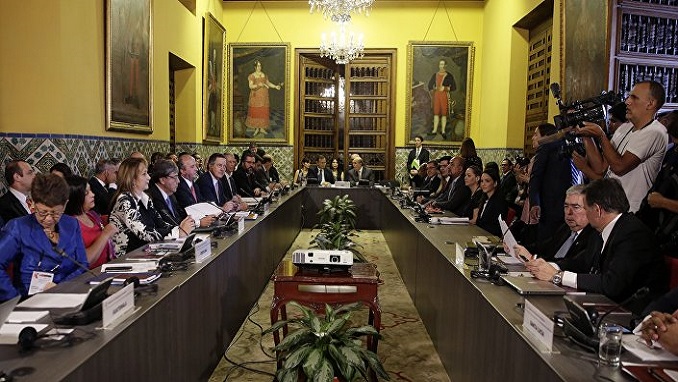The Lima Group said in a statement that it did not recognize the legitimacy of Venezuela’s new National Assembly, Sputnik reports.
“We do not recognize the legitimacy or legality of the National Assembly installed on 5 January 2021,” the Lima Group said. “We call on the international community to join in the disregard and rejection of this illegitimate National Assembly and to support the efforts for the recovery of democracy, respect for human rights and the rule of law in Venezuela.”
The new makeup of the Venezuelan National Assembly, elected in December 2020, began work on Tuesday. On the same day, the assembly stripped Juan Guaido, who had illegally proclaimed himself interim head of state, of the post of parliament speaker, and pro-government lawmaker Luis Parra was elected.
However, lawmakers-associates of Guaido gathered separately and decided he would remain speaker for the next year, and the opposition parliament would continue to work.
The PSUV, the party of Nicolás Maduro, claimed a resounding victory in the 2020 parliamentary elections held in December. Maduro not only barred most opposition parties from fielding candidates, but ordered his puppet Supreme Court to take over the two largest opposition parties and replace their leaders with socialist cronies.
Many of those allowed to participate in the election boycotted; the Venezuelan polling firm Meganálisis estimated a record-low voter turnout rate of under 20 percent.
Given the illegitimacy of the election, Juan Guaidó, constitutionally the president of Venezuela and president of the National Assembly, held a parallel swearing-in ceremony in an undisclosed venue Tuesday for the lawmakers that were elected in the last free elections the country held, in 2015.
The incoming PSUV lawmakers replaced Guaidó as president of the National Assembly with Maduro loyalist Jorge Rodríguez, who called for “exorcising” the Assembly of anti-Maduro voices.
“We are obligated to [an] exorcism,” Rodríguez said, referring to the anti-Maduro opposition — many of whom are also socialists — as demons. “We have to anoint every corner of these walls with holy water.”
“We have to see with alarm what has happened in this Assembly in the last five years. Reconciliation yes, but not amnesty; democratic expression yes, but not without memory. There are crimes that cannot be forgiven, they must be paid for,” Rodríguez said, presumably hinting at prosecution against opposition lawmakers and Guaidó himself.
The chaotic situation leaves Venezuela with two competing presidents and two competing National Assemblies. As Maduro controls the armed forces, his supporters will most likely act as the leaders of the country in practice.
The new president of the Assembly addressed Guaidó personally, accusing him of allegedly misappropriating nearly $2 billion without evidence. Lawmakers allied to Guaidó are currently embroiled in an ongoing corruption scandal for alleged ties to a corrupt official profiting from emergency aid, but that case involved much smaller numbers.
The $1.7 billion figure appears to be a reference to gold the government in Venezuela has stored in the UK, which ruled that, as the nation’s legitimate president, Guaidó and not Maduro should have access to it.
Among Rodríguez’s other accusations against Guaidó and the mainstream opposition were claims that Guaidó had “allied himself with paramilitaries to assassinate President Nicolás Maduro” and that Guaidó “served the U.S. to steal the Esequibo from us,” referring to a Guyanese territory that Maduro insists belongs to Venezuela.
